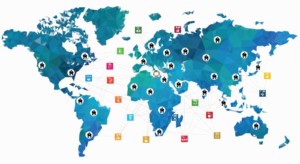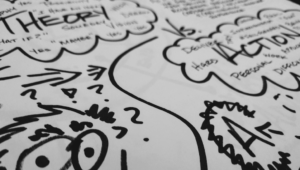Iterative Development
Qualcom technologist Marie Bjerede wonders if the top-down reform model doesn’t work, why there’s not more iterative development:
In the software world, we address this dilemma through an iterative development model. That is, we assume that when we are thinking about what users might need or how they will use our product, we will get some things wrong. So we code up some simple end-to-end functionality, throw it out for people to use, and then improve it iteratively based on feedback from our users. This feedback may be explicit, in the form of questions and requests, or implicit, based on our observations of how the software is used. It may well be automated, in the way Google instruments the applications we use and modifies them based on how we engage.
This approach is often best for application development and is related to the lean capitalization approach to building a business that usually works best these days. But it’s tough to do in schools. Here’s a few of the reasons
- Little discretionary time or money
- Frequent compliance pressure
- Pressure for performance on traditional measures
- Little real time performance data
- Risk adverse culture and little entrepreneurial experience
The good news is that there are a growing number of edupreneurs using an iterative development process to build products and services for schools. Charter management organizations seem to be more nimble than school districts in building instructional solutions; this post on Success Network illustrates that point. It’s been fun to watch the Edmodo team respond in real time to teacher feedback and quickly add functionality.
Marie closes with a conceptual frame that makes some sense, particularly if schools invite partners to join them in solution building.
Traditional education reform fails to scale because top-down designs don’t survive the reality of the day-to-day classroom. Emergent designs adapt to real circumstances but depend on extensive data collection driving feedback loops at every level. Not only is this not well supported by existing technology implementations, but the functional requirements of those implementations are not yet well understood. Through a process of co-evolution, those requirements can be surfaced and technology platforms developed that can then enable education reform to scale.
At the system level, Joel Klein is promoting this kind of bottom-up innovation by closing bad schools and inviting groups to start new schools. The best example may be Klein’s expansion of the NYC iZone. It has all the right ingredients: autonomy to innovate, capable partners, and a context of accountability.
Freemium business models will be the most interesting and iterative space for the next few years. Free platforms and applications are gaining traction and building premium services based on customer need and discovered sources of value-add.
Large scale reform can bring up the laggards (e.g., NCLB) or feed the rabbits (e.g., RttT), but iterative development will continue to be an important source of innovation in a cash strapped sector with little R&D.








0 Comments
Leave a Comment
Your email address will not be published. All fields are required.